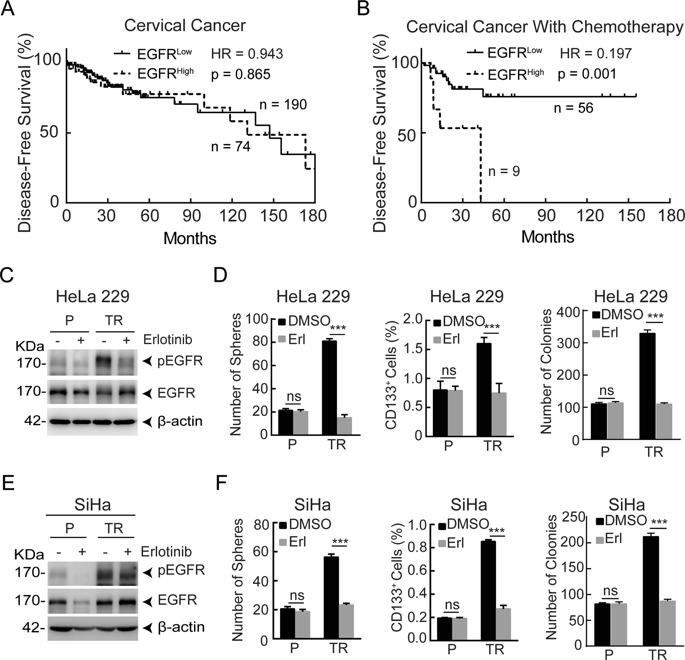Oncogenesis ( IF 5.9 ) Pub Date : 2019-11-26 , DOI: 10.1038/s41389-019-0179-2 Yaping Lv 1 , Wei Cang 2 , Quanfu Li 1 , Xiaodong Liao 1 , Mengna Zhan 3 , Huayun Deng 1 , Shengze Li 1 , Wei Jin 1 , Zhi Pang 1 , Xingdi Qiu 2 , Kewen Zhao 4 , Guoqiang Chen 4 , Lihua Qiu 2 , Lei Huang 1

|
Cancer stem cells (CSCs) are often enriched after chemotherapy and contribute to tumor relapse. While epidermal growth factor receptor (EGFR) tyrosine kinase inhibitors (TKIs) are widely used for the treatment of diverse types of cancer, whether EGFR-TKIs are effective against chemoresistant CSCs in cervical cancer is largely unknown. Here, we reveal that EGFR correlates with reduced disease-free survival in cervical cancer patients with chemotherapy. Erlotinib, an EGFR-TKI, effectively impedes CSCs enrichment in paclitaxel-resistant cells through inhibiting IL-6. In this context, MUC1 induces CSCs enrichment in paclitaxel-resistant cells via activation of EGFR, which directly enhances IL-6 transcription through cAMP response element-binding protein (CREB) and glucocorticoid receptor β (GRβ). Treatment with erlotinib sensitizes CSCs to paclitaxel therapy both in vitro and in vivo. More importantly, positive correlations between the expressions of MUC1, EGFR, and IL-6 were found in 20 cervical cancer patients after chemotherapy. Mining TCGA data sets also uncovered the expressions of MUC1-EGFR-IL-6 correlates with poor disease-free survival in chemo-treated cervical cancer patients. Collectively, our work has demonstrated that the MUC1-EGFR-CREB/GRβ axis stimulates IL-6 expression to induce CSCs enrichment and importantly, this effect can be abrogated by erlotinib, uncovering a novel strategy to treat paclitaxel-resistant cervical cancer.
中文翻译:

厄洛替尼通过阻断 MUC1 阳性宫颈癌中的 EGFR-CREB/GRβ-IL-6 轴来克服紫杉醇耐药的癌症干细胞
癌症干细胞(CSC)通常在化疗后富集并导致肿瘤复发。虽然表皮生长因子受体 (EGFR) 酪氨酸激酶抑制剂 (TKI) 广泛用于治疗多种类型的癌症,但 EGFR-TKI 是否对宫颈癌中的化疗耐药 CSC 有效尚不清楚。在这里,我们揭示了 EGFR 与接受化疗的宫颈癌患者无病生存率降低相关。厄洛替尼是一种 EGFR-TKI,通过抑制 IL-6 有效阻止紫杉醇耐药细胞中 CSC 的富集。在这种情况下,MUC1 通过激活 EGFR 诱导紫杉醇耐药细胞中 CSC 富集,从而通过 cAMP 反应元件结合蛋白 (CREB) 和糖皮质激素受体 β (GRβ) 直接增强 IL-6 转录。厄洛替尼治疗使 CSC 在体外和体内对紫杉醇治疗敏感。更重要的是,在20例宫颈癌化疗后患者中发现MUC1、EGFR和IL-6的表达呈正相关。挖掘 TCGA 数据集还发现,MUC1-EGFR-IL-6 的表达与化疗宫颈癌患者的不良无病生存率相关。总的来说,我们的工作证明MUC1-EGFR-CREB/GRβ轴刺激IL-6表达以诱导CSC富集,重要的是,厄洛替尼可以消除这种效应,从而揭示了治疗紫杉醇耐药宫颈癌的新策略。











































 京公网安备 11010802027423号
京公网安备 11010802027423号